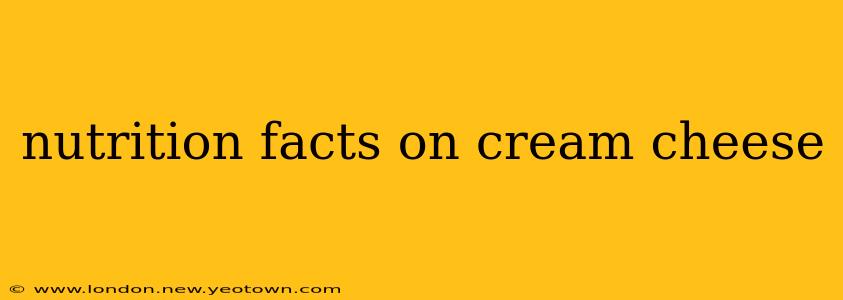Cream cheese. That luscious, tangy spread that elevates bagels, tops desserts, and adds a creamy richness to countless recipes. But beyond its delightful taste, what's really in that little tub? Let's dive into the nutritional facts of cream cheese, uncovering its composition and addressing some common questions.
My name is Alex, and I've spent years researching food science and nutrition. I'm passionate about helping people understand the food they consume, so let's unravel the mysteries of cream cheese together.
What are the main nutritional components of cream cheese?
Cream cheese is primarily made from cream and milk, hence its rich, creamy texture and flavor. This translates to a nutritional profile that's high in fat and calories, but also provides a decent source of protein and some essential nutrients. A typical serving (around 30 grams, or about one ounce) will offer:
- Fat: This is the dominant component, largely composed of saturated fat. This is something to be mindful of as part of a balanced diet.
- Calories: Cream cheese is calorie-dense due to its high fat content.
- Protein: While not a primary protein source, cream cheese does contribute a moderate amount of protein per serving.
- Calcium: Derived from the milk solids, cream cheese provides some calcium, important for bone health.
- Other nutrients: Cream cheese contains small amounts of other vitamins and minerals, but they're not usually considered significant contributors to your daily intake.
How many calories are in cream cheese?
The calorie count in cream cheese can vary slightly depending on the brand and type (e.g., light cream cheese versus full-fat). However, a common estimate for one ounce (approximately 30 grams) of full-fat cream cheese is around 100 calories. Light cream cheese versions aim to reduce calories and fat, typically by incorporating less cream. Always check the specific nutritional label on your chosen brand for precise calorie information.
Is cream cheese high in saturated fat?
Yes, cream cheese is relatively high in saturated fat. This is because it's primarily made from dairy products rich in this type of fat. While saturated fat is a necessary part of a balanced diet, it's crucial to consume it in moderation as excessive intake is linked to increased cholesterol levels and heart disease risk. Choosing light cream cheese or incorporating it sparingly can help manage saturated fat consumption.
How much protein is in cream cheese?
Cream cheese provides a moderate amount of protein per serving. One ounce (approximately 30 grams) generally contains around 2 grams of protein. While it's not a primary source of protein in a diet, it still contributes to your daily protein needs.
What are the health benefits (if any) of eating cream cheese?
Cream cheese, while high in fat and calories, isn't entirely devoid of potential benefits. Its calcium content offers a small contribution towards bone health, and the protein provides some building blocks for muscle repair. However, it's important to remember that these benefits are minor compared to the calorie and fat content. Moderation is key.
Is cream cheese healthy?
Whether cream cheese is "healthy" is subjective and depends on individual dietary needs and overall eating habits. Its high fat and calorie content mean it should be consumed sparingly as part of a balanced diet. It’s not a health food in the sense of being nutrient-dense, but it can be part of a varied diet in moderation.
Remember to always check the nutrition label on your specific cream cheese product for the most accurate and up-to-date nutritional information. This information is for general knowledge and shouldn't replace advice from a registered dietitian or healthcare professional. As with all foods, balance and moderation are vital.

